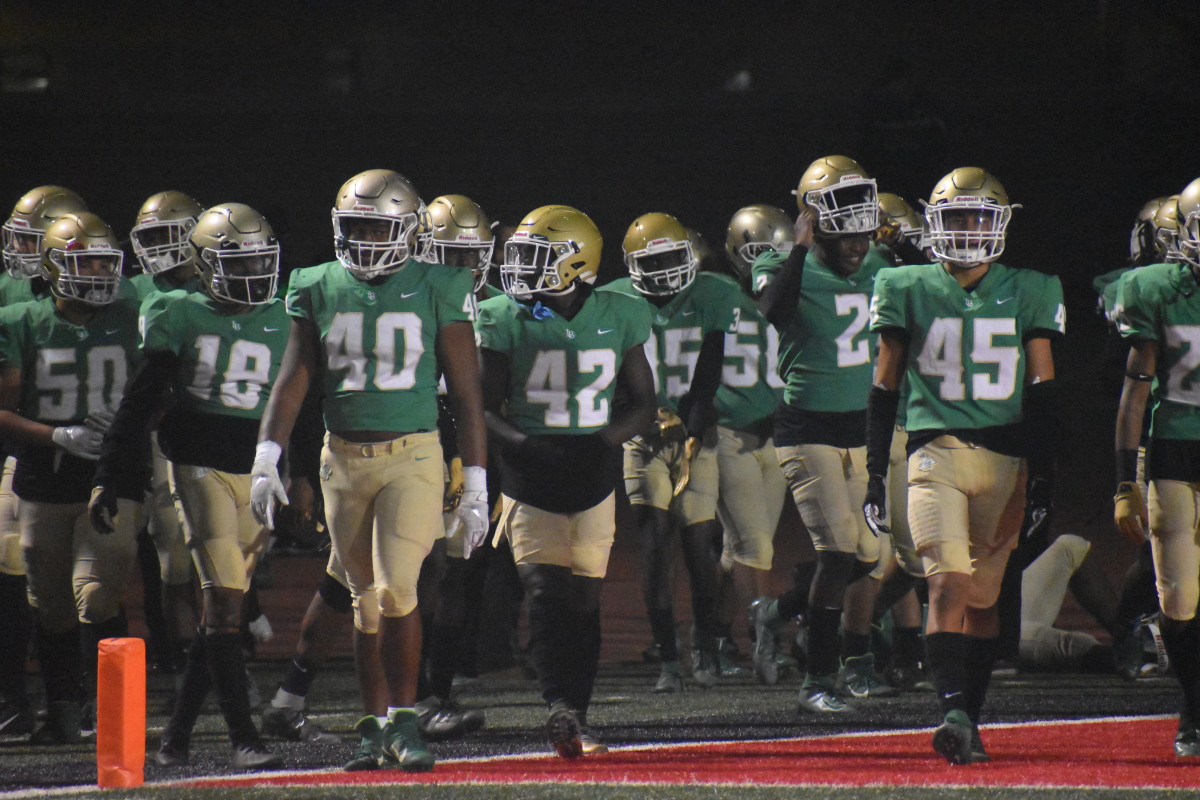How Mick Hoffman became the most powerful figure in Washington high school sports

VANCOUVER — Mick Hoffman stood in his parents’ kitchen, an 18-year-old seeking direction, and had to break the news to his mom: three days into his freshman year of college, he was dropping out.
He’d enroll at the local community college for the year, he promised, but leaving Concordia College meant giving up the comprehensive scholarship package the school gave him. If he were to continue to go to college, he’d have to pay his own way.
“I remember breaking my mom's heart,” Hoffman said. “She was worried I wasn't going to finish because we couldn't afford it.”
But Hoffman felt out of place. The school of some 300 students was too small for him, and when it came to a career, like many college students, he was uninspired and directionless.
Not long after, Hoffman received a call that changed the course of his life. Bob Benson, Hoffman’s basketball coach at Hudson’s Bay High School, was on the line, reaching out about an assistant coaching opening.
“He was working in a warehouse in Portland and I guess he didn't really have the vision, the dream to get on a path to where he wanted to go,” Benson said. “I guess I thought I needed to kick him in the pants a little bit to unleash some of that potential.”
It didn’t take long for Hoffman to take to coaching. He loved basketball, and quickly discovered a passion for helping kids, which became a through-line for a career that, at age 18, was unfathomable: nine years of teaching, nearly two decades as an administrator and, now, as of July 1, the executive director of the Washington Interscholastic Activities Association.
It’s fitting that the person holding perhaps the most powerful position in Washington high school sports once stood at the crossroad between education and a career with little idea of what the road ahead might look like.
And it was his relationship with his high school coach that steered him into a career in education-based athletics. Or as Hoffman says, “I kind of fell into it.”
* * *
The neighboring cities of Esmond and Harvey, North Dakota are about a 30 minute car ride apart, and Hoffman reckons with uncertainty that his parents, Cheri and John Hoffman, met at a state dance somewhere near their respective hometowns.
They married, and John went off to serve in the Vietnam War as a medic. Upon return, the two decided to follow relatives and move to Vancouver, where he knew was away from the railroad job that inevitably awaited him back home. Instead, he got a job with the Department of Veterans affairs, first in a hospital, then as a gardener.
Cheri Hoffman ran her own cleaning business and to this day volunteers at the Children’s Justice Center in Southwest Washington working with victims of abuse. Neither were college educated, but they knew the value of an education.
School always came easy for Mick Hoffman, who was born and raised in Vancouver, but he had no idea what kind of career he wanted to pursue. But Hoffman says he wasn’t attune to viable career options in ways today’s high schoolers are.
“Hell, if I would have known about longshoring, I probably would have been a longshoreman, it would have been perfect,” he said. “Just go to work, have some fun, but go do what you want with your free time.”
Hoffman wanted to be purposeful with his time in college, and when he went to Concordia to play basketball, he majored in business. He didn’t know what a business degree would do for him, mostly because he didn’t even know what he wanted to do.
When he got Benson’s call about a JV boys basketball coaching opening at Hudson’s Bay, he simply knew he loved basketball.
As time went on, through coaching, Hoffman saw a connection between impacting kids on the court and in the classroom. A vision of a career in education began to form.
“If (coaching) is what I wanted to do, what am I going to do to make it happen?” Hoffman said. “That's the way I've done everything since: figure out what I want at the end and find a way to make it happen.”
Hoffman finished out his first year in community college, then took an entire year off to work in a warehouse full-time and save money. He went back to Concordia in 1990, and wasn’t finished with a full month of school when he got a call from Tammi Mulholland, his then-girlfriend who was pregnant: she was going into labor.
Benson was at the hospital when Kirsten, their first child, was born, a labor Tammi Hoffman describes as hard and awful. "Bob told him if he could coach me through that, he could do any kind of coaching he ever put his mind to,” Tammi Hoffman said.
“He had just decided to go to school, we were on that path, then all of a sudden things were going to have to be different. It was a big change,” she said.
So Hoffman finished out the term, and then dropped out of school again to save money. Kirsten was a welcome addition to the family, and Tammi and Mick followed through with plans to get married the following summer. Benson was Hoffman’s best man.
“Matter of fact, we got married and I think I took finals that Monday, so that's kind of been our life ever since,” Hoffman said.
Tammi added: “He has the memory of an elephant.”
Shortly thereafter, Hoffman enrolled at the University of Portland to get his teaching degree, which he completed in two years and paid his way through, taking only night classes, working full-time and coaching.
Teaching gave him the opportunity to do something he was raised to do: make a positive impact on peoples’ lives.
“You develop these relationships and you get to interact with kids in a totally different way as a teacher, adult or even as a parent,” Hoffman said. “The coaching, strategy, I was always doing something around baseball cards or basketball cards, making up games, directing traffic. I guess it just fit in with that.”
* * *

Benson knew he wanted to be a basketball coach in sixth grade.
He grew up in Coulee City, a “basketball-crazy” town of just over 500 people in Eastern Washington. He went to Central Washington to play football, until injuries forced him to walk away from his playing career. But he found himself in a work-study job with legendary Central Washington basketball coach Dean Nicholson.
Nicholson became his coaching mentor, and the lessons Benson learned propelled him in his early career, which began as a middle school coach before landing his first high school coaching job in 1978.
He relocated to the Vancouver area, and spent 19 years at Hudson’s Bay — nine as the head varsity boys coach — before moving to then-upstart Skyview, where he went on to be the head coach for nine seasons, winning two league titles (2004 and 2010). He stepped down as the head coach in 2011, and is currently an assistant at Skyview under Matt Gruhler.
To this day, Benson has maintained lasting relationships forged on the hardwood.
“A lot of my best friends today were guys who played for me,” Benson told The Columbian in 2011. “I really enjoyed the fact that so many of the guys who played for me came back and coached with me. They thought enough of the program we ran that they wanted to come back and be a part of it.”
One of the most notable of those players was Hoffman.
Offering then-18-year-old Hoffman a job in his program was a no-brainer for Benson, and Hoffman took to coaching well.
Years later, Benson considers Hoffman one of the shining examples of his many longstanding coach-player relationships. He describes Hoffman as a smart player who understood the game and had some leadership ability, which he took as an indicator of coaching potential.
And over the years, the two have seen their lives intertwine. Benson is the godfather to Hoffman’s two children, Kirsten (29) and Tyler (23), and coached Tyler as he came through Skyview’s basketball program.
“It’s all connected,” Benson said recently from Hoffman’s vacation home in Sunriver, Oregon. “It confirms that what I'm doing has made a difference. I have a lot of examples, but that's one of the great ones. Many of my better friends in my life now are kids who have played for me back at Hudson's Bay. All the weddings we go to, the Facebook exchanges, it all confirms that you're doing the right thing.”
Hoffman is reminded of that over the years when former players reach out.
One player was struggling a bit at college and told Hoffman that whenever things got hard, he recalled a story Hoffman told about pushing himself on the treadmill. When the moment he wanted to quit inevitably arrived, he’d push himself to run another mile.
Hoffman was floored.
“I'm thinking, I've told that to kids a hundred times but for him it was impactful,” Hoffman said. “So when he was going through the hard parts, he knew it wasn't as bad as what it seemed and he could prove it because he's done it before.”
He got a chuckle from another former player who used to do odd-jobs for Hoffman on the side to make a little extra money. The two were up at 5 a.m. one morning getting ready to pour concrete, when Hoffman handed him a shovel and motioned him to pick up a pile of dog droppings. The lesson?
“If you don’t have some type of education, you’re going to be picking up someone else’s dog s*** your whole life,” Hoffman said, musing that perhaps that advice would get him fired today.
But his player, who according to Hoffman has now carved out a successful career in finance, took that to heart.
“He called me the same day to tell me he was going to graduate with a double major, because he said, “ ‘coach, I'm not going to pick up someone else's dog s*** my whole life,’ ” Hoffman said.
It’s those kinds of interactions that remind Hoffman of why he got into coaching. And throughout his career in teaching and administration, he’s had mirrored experiences.
Playing sports at an elite level beyond high school was never Hoffman’s calling. But athletics opened the door for him to realize a calling to help the youth. And by extension, for a career in education.
Hoffman has paid forward the olive branch he was extended by Benson as a directionless 18-year-old. Al Alcantar, now the Vancouver Public Schools athletic director, was given his first coaching job and district security job by Hoffman. The two have been friends for more than 30 years.
“If it wasn't for athletics, and his basketball coach (Bob Benson) that believed in him, he wouldn't be where he's at now,” Alcantar said.
---
Andy Buhler is a reporter for Scorebook Live Washington. Hear him weekly on the Scorebook Live Today podcast, follow him on Twitter @AndyBuhler and reach him via email at andy@scorebooklive.com.
